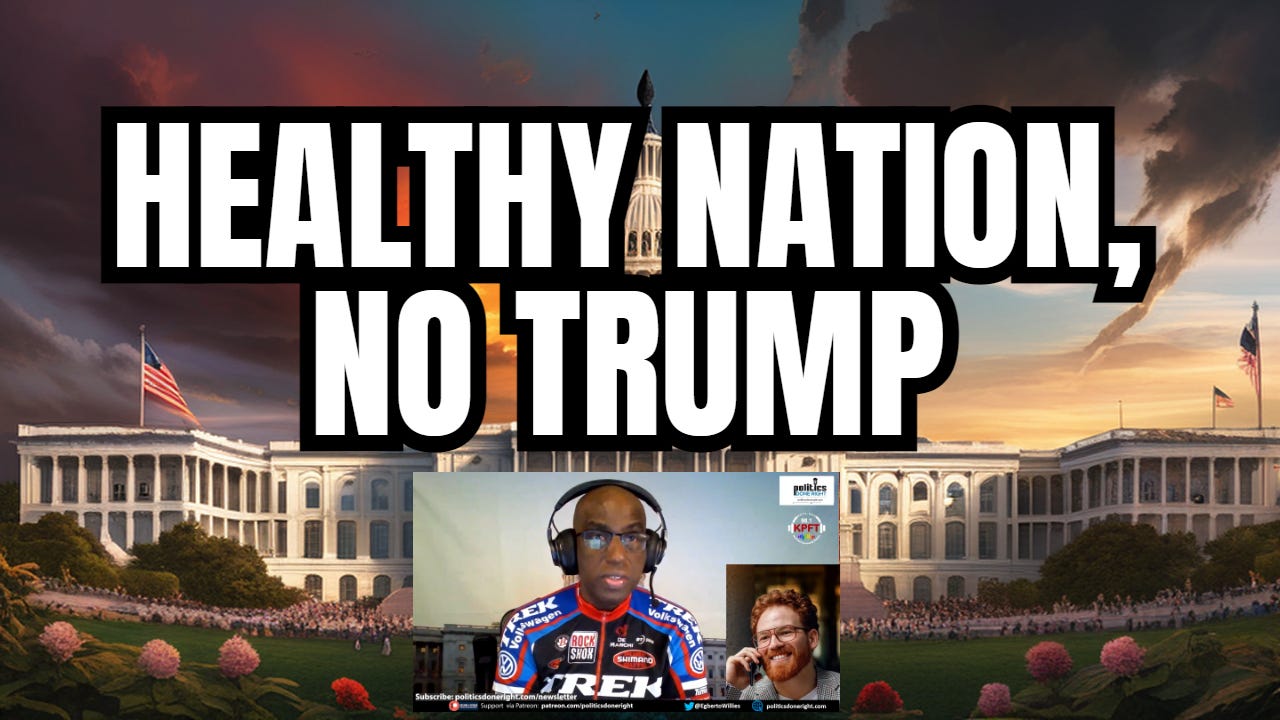Caller: A healthy nation does not elect a Donald Trump. Host: Why and how can we fix it?
A caller to my program, Politics Done Right, called in with a prescient statement and questions about the state of our country. He points out correctly that a healthy nation would not elect a Trump.
In a recent engaging conversation on progressive radio show Politics Done Right, the host and a caller named John delved into the pressing issues that underscore the unhealthy state of American politics, epitomized by the election of Donald Trump. John initiates the dialogue with a poignant assertion: “A healthy nation does not elect a Donald Trump.” This statement serves as a springboard for an in-depth analysis of the United States’ multifaceted challenges, from the economic disparities exacerbated under Trump’s administration to the systemic flaws within the Electoral College. The conversation further explores strategies for reclaiming the political landscape from the clutches of divisive rhetoric and policies, emphasizing the necessity of a holistic approach akin to the successful multifaceted treatment strategies for HIV/AIDS.
Under Trump’s presidency, the economic plight of the average American was stark, with about 80% living paycheck to paycheck amidst a booming stock market that benefited a sliver of the population. This disparity highlights a profound sickness within the nation—a sickness rooted in an economic system that prioritizes capital accumulation over the well-being of its citizens. While the situation has somewhat improved under Biden’s administration, with a reduction to about 60% living paycheck to paycheck, the issue remains critical, affecting the vast majority of the population. This economic distress serves as fertile ground for populist leaders like Trump, who exploit the dissatisfaction and disillusionment of the people.
The caller’s reference to the Electoral College and the disproportionate influence of states like Wyoming through the Senate and Electoral College votes brings to light the systemic imbalances that skew political representation. This discussion segues into the pivotal question of engaging Trump voters and the identity of those steering the course of Biden’s presidency. The host’s response underscores the importance of dialogue and understanding, drawing from personal experiences in Texas to illustrate the potential for bridging ideological divides through respect and empathy. This approach is essential for fostering a more inclusive and understanding political discourse that recognizes the shared values and concerns that unite rather than divide.
The conversation also touches upon the critical need for revitalizing the middle class, a demographic that has borne the brunt of economic policies favoring the wealthy. This decline, vividly described through the caller’s recollection of a once universally middle-class Silicon Valley, underscores the urgency of addressing economic inequalities to restore the nation’s backbone. The economic system, governed by a mathematical formula that inevitably widens the wealth gap, is identified as a root cause of the nation’s ailments, necessitating a comprehensive overhaul to ensure sustainability and equity. It is mathematically unsustainable for a system where income and wealth grow faster than the average American’s. We are living with the effects of the effective transfer of our wealth to the few on the top who control capital.
Moreover, the dialogue briefly explores the shifting allegiances within the political landscape, exemplified by the changing perspectives of public figures like Bill Maher. This shift reflects a broader debate on the essence of progressivism and its role in addressing the nation’s systemic challenges. The host argues for a progressive agenda that directly confronts the economic and social injustices, challenging the complacency that has crept into some quarters of the political discourse.
The conversation concludes with a reflection on leadership and the age debate concerning President Biden. The host acknowledges Biden’s contributions while advocating for generational change, highlighting political leadership’s dynamic and evolving nature and the continuous struggle for a more equitable and just society.
A healthy nation does not elect a Donald Trump.
This insightful exchange encapsulates the critical issues at the heart of American politics, from economic inequality and systemic bias to the imperative of constructive dialogue and progressive action. It serves as a clarion call for a holistic approach to healing the nation, addressing the root causes of its ailments, and fostering a political environment where the dignity and well-being of every citizen are paramount.
Please support our values via Independent Media.
The other side has big donors and everyday citizens who invest heavily in platforms that lie and misinform. All we have is you. So, please invest in our media outlet by clicking the subscribe button below to become a paid subscriber. You won’t miss that coffee, but it will make a difference in our politics as we spread the truth about our policies and progressive politics. All paid subscribers get to read my five books on this platform and all subsequent books I write. They will also be privy to subsequent incentives.







